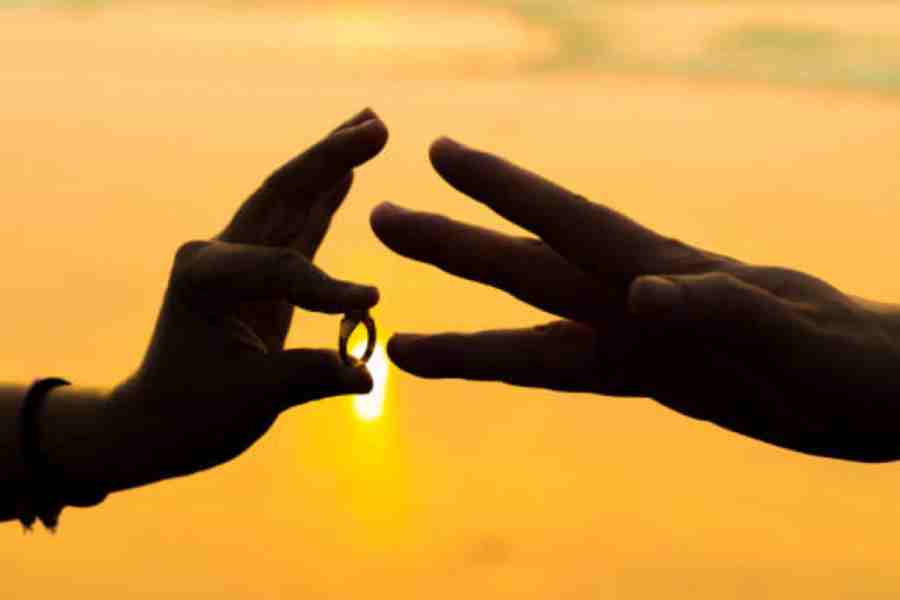Take charge
Sir — New-age couples have turned the rules of courtship on their heads. However, when it comes to popping the big question, heterosexual partners still stubbornly stick to the age-old convention of men going down on one knee with an engagement ring in hand. In fact, several surveys suggest that an overwhelming number of marriage proposals are still made by men. This is probably because of the social stigma attached to a woman who makes the first move in a romantic relationship. She is usually perceived as aggressive and over-ambitious. But at a time when women are redefining ambition by surging ahead of men in many spheres, there is no reason for them to shy away from taking the lead in asking for their partners’ hands in marriage.
Sonali Maity, Calcutta
Identify the cracks
Sir — When he was questioned about the discrimination being faced by minorities in India during his recent trip to the United States of America, the external affairs minister, S. Jaishankar, vociferously defended the Narendra Modi government, arguing that every Indian has equal access to benefits and services (“‘I defy you to show me discrimination’”, Oct 1). This is grossly inaccurate. A study has noted that there has been a 786% increase in hate crimes against religious minorities in India between 2014 and 2018.
The minister seems to be oblivious to the spate of attacks on minorities, be it the Islamophobic slurs hurled at a Muslim parliamentarian, the lynching of a differently-abled Muslim man near a temple in Delhi, the attack on Muslims by cow vigilantes or the vandalism of churches. What must be noted is that organised crimes against minorities have witnessed a rise since Narendra Modi’s ascendance to power.
Zakir Hussain, Kazipet, Telangana
Sir — In his address to the United Nations General Assembly last week, S. Jaishankar used both ‘Bharat’ and ‘India’ in the course of his speech. This nullifies the ‘India versus Bharat’ debate that is being fomented only to serve narrow political purposes. The government has been claiming that the use of ‘Bharat’ is an assertion of the country’s identity as opposed to the moniker, ‘India’, which, according to the Bharatiya Janata Party, was given by the British. Jaishankar’s use of both names signals an adherence to constitutional wisdom.
Shovanlal Chakraborty, Calcutta
Welfare first
Sir — Manoj Kumar Jha’s article, “Break the silence” (Oct 1), rightly points out that “[w]hile we launched Chandrayaan-3 and reached the moon, it is ironic that as a nation we have not been able to secure a life of dignity for a significant portion of our population.” While the pursuit of science is necessary, priority must be given to securing the hungry and the poor segments of the population. At a time when India is being lauded for the success of Chandrayaan-3, its performance on key human development and quality of life indices has been abysmal — the country has fallen to the 107th position among 121 countries in the Global Hunger Index.
Incidentally, several countries that have performed well on the GHI and allocated resources for the benefit of their citizens are yet to put their flags on the moon. Prioritising public welfare over scientific explorations is not imprudent. A nation’s true strength lies in the well-being and education of its citizens.
Sujit De, Calcutta
On the wane
Sir — In “Hemmed in” (Sept 30), Saikat Majumdar rued that while financial constraints, the rising cost of living and shifts in demography are leading to a sharp decline in applications to liberal arts programmes in Western universities, political interference is impacting the field in India. The professors, Sabyasachi Das and Pulapre Balakrishnan, recently resigned from Ashoka University alleging an environment of fear. This is deplorable.
Sukhendu Bhattacharjee, Hooghly
Security risk
Sir — The Indian high commissioner to the United Kingdom, Vikram Doraiswami, and the Indian consul-general in Edinburgh were stopped from entering a gurdwara in Glasgow (“UK India envoy scoots gurdwara snub”, Oct 1). The diplomats’ vehicle was accosted at the parking lot. This is a matter of grave concern. The UK authorities should have taken adequate measures to ensure the security of the visiting envoy in light of the ongoing spat between India and Canada and the rise in threats from extremist elements.
This incident, along with the attack on the Indian consulate in San Francisco
in July, is a stark reminder that religious extremists are expanding their bases
in Canada and other countries.
Ramesh G. Jethwani, Bengaluru
Sir — The manner in which Vikram Doraiswami and another senior Indian diplomat in the United Kingdom were stopped from entering a gurdwara in Glasgow is shocking. There has been a surge in Khalistani sentiments abroad. Reports of attacks on Indian public offices and temples in Canada, Australia, the UK, and the United States of America are disconcerting. New Delhi should keep negotiating at the highest diplomatic level to ease tensions.
Sravana Ramachandran, Chennai
Great mysteries
Sir — It is heartening that a Nasa mission has finally been able to return samples of Asteroid Bennu to Earth. This will offer insights into the genesis of the solar system and, possibly, the evolution of life on Earth. Discovered in 1999, Asteroid Bennu is believed to be a significant repository of the solar system’s history. Nasa’s success has, once again, proved that tenacity and imagination can be key to unravelling the mysteries of the universe.
Amit Brahmo, Calcutta










